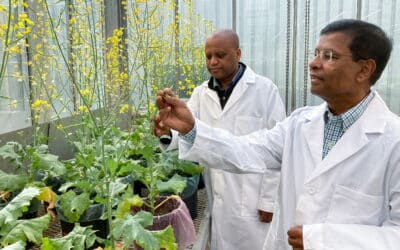CRISPR and other gene-editing technologies have changed the game for plant researchers and developers as they prepare to bring hundreds of potentially new products to stores.
Supporters of gene editing believe it is more precise and quicker than traditional crop breeding methods. Gene editing also helps address the constant issue of food security across the globe, according to a release from Iowa State University’s News Service.
Despite the benefits of gene edited (GE) crops, critics insist this new technology could result in unintended consequences that must be addressed by government agencies. Gene-edited foods are currently not required to be labeled under current federal law.
These battling viewpoints, in addition to the backlash over genetically modified crops (GMOs), create skepticism among communities. Gene editing occurs through natural breeding and differs from GMOs, as it does not introduce DNA from other species.
A study from Iowa State University surveyed 2,000 United States residents to gauge public acceptance of gene-edited foods. Participants shared whether they would consume or purposefully avoid gene-edited foods, allowing researchers to understand factors that impacted their decisions.
Researchers plan to host the survey every two years for a decade to record how public opinions on gene-edited foods change as additional products come to market.
“Right now, there are a lot of people in the middle. They have not fully made up their mind about gene-edited foods, but as they learn more about the technologies and products, they will likely move to one side of the issue. I think it will depend on their consumer experience — what kind of messaging they trust and who sends it, as well as what products they encounter,” said Christopher Cummings, senior research fellow.
Social Values Matter
The study found that a person’s likelihood of consuming or avoiding GE foods is driven by their values and the level of trust they have in the government, industry and environmental groups.
“Food industry experts tend to have the mindset that people make decisions about food based on the cost, appearance, taste and nutritional content. But our study shows that when you have a new technology that people are not familiar with, other factors play a much bigger role, especially people’s social and ethical values, and whether they trust government and industry to protect them,” shared David Peters, a professor of sociology and a rural sociologist with ISU Extension and Outreach.
The study revealed that people who view science and technology as the favorable option to solve society’s problems are more willing to consume raw or processed GE foods. These consumers trust government food regulators and the agriculture biotechnology industry and do not hold strong beliefs on how food should be produced. This pool of people tends to be younger with a higher level of education and greater household incomes, according to the release.
In contrast, people who are less likely to eat raw or processed GE foods are more doubtful of science and technology. Greater value is placed on food production and ethics, with personal beliefs and environmental groups taking priority over government and industry opinions.
About 60 per cent of women surveyed said they would purposely avoid GE foods and refuse to eat them, shared the release.
An additional study set to publish this year revealed 75 per cent of the U.S. public believe e a federal labeling law for GE foods is necessary.
“The worry is that if more of these gene-edited foods move onto the marketplace and consumers don’t know, there will be a backlash when they find out,” said Peters. “Ag biotech companies who support voluntary labels want other companies to follow suit. The hope is that labels will improve transparency and instill trust among consumers, avoiding any potential backlash or opposition to the technology.”
The Gene Edited Foods Project research team, a group of experts from ISU and the State University of New York College of Environmental Science and Forestry that includes Peters and Cummings, are working to create recommendations for governance tools and a plan of action to address holes in public trust in relation to GE foods.
Read More About Gene Technology:
Grain Farmers Enter Novel Food Discussion, Support Gene-Edited Crops





